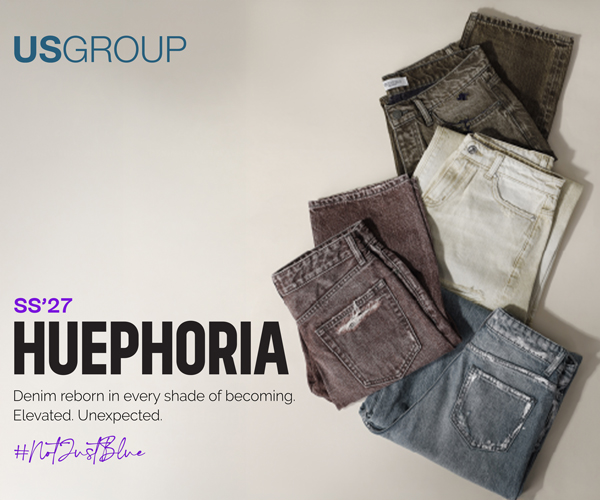Forever filtered

An innovative water treatment system at Cone Denim’s facility in Parras, Mexico, takes reverse osmosis to new heights. The technology is not only used to soften water for processing but also to purify the factory’s effluent and continuously recycle water for reuse in the zero liquid discharge mill.
Every 90 minutes, every day of the year, a technician samples a full beaker of liquid from one of the tiered pipes of the new water treatment facility at the Cone Denim Parras plant. It is weighed and its content analysed, feeding a database that continuously monitors the process.
Depending on what type of denim fabrics are in production, the factory’s effluent is ever changing, César Albarran, general manager of the plant, tells Inside Denim. This explains in part the constant surveillance. For the process to work smoothly and generate the required level of water purity, the presence of solids and their make up requires non-stop monitoring and fine-tuning. Throughout the years that it took to set up the zero liquid discharge (ZLD) system, this is one of the key parameters that define zero liquid discharge.
The ultrafiltration and reverse osmosis machinery is housed in a brand-new building and has been in operation for a year. Victor Rodriguez, plant engineer and project manager, is the person who oversaw the development of this ground-breaking effluent treatment system that complies with Mexican norms and ZDHC guidelines.
One of two plants that Cone Denim operates in Mexico, it is located in the picturesque town of Parras in the state of Coahuila. The northern region of the country is arid, but Parras was established in an oasis, and its landscape is dotted with palm trees, pecan tree groves and vineyards.
The state-of-the-art ultrafiltration and reverse osmosis system is part of Elevate Textile’s commitment to reduce its water usage by 25% per unit of production by 2025. The $5 million investment in the Parras plant allows it to reuse what is estimated to be 100 million gallons per year. It thus plays a key role in reducing the group’s water footprint. Cone Denim owner Elevate Textiles has reduced water consumption by 22.1%, compared to 2016 levels, as it states in its 2022 sustainability report.
At scale
The multiple stage process treats 11,000 gallons of water per hour, or close to 42,000 litres. Effluent from the plant’s wet processing operations is first sent to a biological treatment basin. This is where denim fibres are filtered out, among other organic substances. After this first phase, effluent is then sent to the ultrafiltration unit, where it passes through five membranes, further separating any solids from the liquid. In a third and final phase, effluent goes through the reverse osmosis system. Here seven different membranes filter out the last remaining unwanted chemicals at a rate of up to 1,400 litres (308 gallons) per minute to deliver clean, soft water. Mr Albarran says the main challenge here was to scale the process. This took several years, multiple iterations and pilot tests before achieving the desired speed and efficiency.
“The most complex part of the process is managing the solids to optimise the system. If there is too much, the system would clog, but too little can also be an issue,” he says. Continuous monitoring is necessary to adapt to changing manufacturing parameters, as different production runs will use a different set of dyes, chemicals and finishes. “Our team is very much committed to making this system work at its best, and this involves a constant finetuning of the units,” says Mr Albarran.
When operating at scale, the infrastructure could enable the Cone Denim Parras plant to recycle up to 90% of its wastewater for reuse in its manufacturing processes. The remaining 10% is sent to a vast pool roughly the size of a football pitch and 45 feet or 14 metres deep. Sprinklers in rows spray water into the air to accelerate evaporation and return what is left to the natural cycle. This, says Mr Albarran, is the best solution for the small proportion of wastewater that cannot be recycled.
Optimising energy
Cone’s Parras plant includes a co-generation system that has been in operation since 2015. The natural gas-powered facility generates 80-90% of the factory’s electricity, steam and hot water needs. Additionally, water used to cool the co-generation machinery is channelled directly to the factory’s wet processing operations as is the steam. This unit generates 7 megawatts (MW), Mr Albarran tells Inside Denim, and covers close to all of the factory’s needs that he says are in the order of 8.1 MW. Energy consumption is another closely monitored concern for the company. “We are always keeping an eye on signs of corrosion and steam leaks that need to be fixed. It is a never-ending job,” he says.
The denim making facility in Parras began operations in 1995, and Mr Albarran heads it since 2021. Cone Denim has a second Mexican plant, located in Yecapixtla, since 1998. The group’s third mill, in Jiaxing, China, was added in 2007.
The Parras plant produces 600,000 yards a week. Its spinning operations include both open end and ring spinning equipment, and it has 158 looms. It stocks on average 2.5 million yards of fabric, corresponding roughly to one month of production, says Mr Albarran. The newest machine to be installed in the facility, a Trützschler blender, was in the process of combining cotton, Tencel, Coolmax and CiClo fibres into an intimate blend when Inside Denim visited the site.
Optimising operations for efficiency and to make the best use of waste – recycling cotton fibres from spinning - is all part of the mill’s staff everyday tasks. For those working in the new water treatment facility, their routine is even more rigorous. “The system can never stop, it functions 24/7, 365 days a year,” says Mr Albarran. “We cannot send a drop of blue water anywhere.”
Cone Denim’s state-of-the-art wastewater treatment unit progressively rids effluent of fibres, chemicals and unwanted elements to recycle 90% of the water it uses in a closed loop.
Photo: Cone Denim













